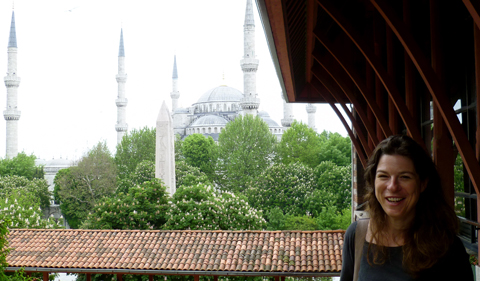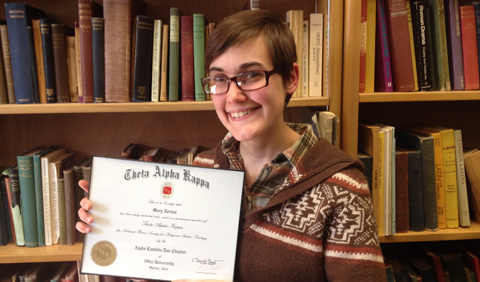By Steve Hays
Associate Professor
Department of Classics and World Religions
Dear Joe,
C.S. Lewis (the Narnia guy and Milton scholar at Oxford and Cambridge), summing up his life at age 18, when he was admitted to Oxford, said:
Nearly all that I loved I believed to be imaginary; nearly all that I believed to be real I thought grim and meaningless.
The year was 1916, but many 18-year-olds feel the same in 2013. Well-meaning adults have convinced them that to become responsible adults they must conform themselves to “reality,” which means economic “reality” above all else. So, smart, hardworking students arrive at Ohio University determined to abandon whatever dreams animated their younger years and make “adult” decisions calculated to result in “success.” They want economic security, of course, but in and of itself economic success is “grim and meaningless.” Students put on a good face, but in far too many cases their eyes cannot hide what their hearts are asking: “Is this all there is to college: Checking off requirements till somebody hands me a diploma so I can earn a paycheck?”
Many incoming OU students long for things that money cannot buy nor social prestige confer, but they try to put those dreams behind them because the adult world tells them that those desires are “naïve” or “childish.” You know the kinds of dreams I’m talking about: to understand what is really good and right; to become wise, honorable, and courageous; to pursue what is right even when it’s hard. Though they might never tell even their best friends, these students would rather be Frodo Baggins or Sam Gamgee than Jay Gatsby or Gordon Gekko. They would rather be Martin Luther King Jr. or Rachel Carson than Donald Trump or Lady Gaga. Merely being rich and famous strikes these students as “grim and meaningless.” It would probably embarrass them to say it openly, but what they really long for in some fashion or another is to be a hero: the kind of person who makes the world better even if it costs them money or social status.

Some people would rather be rich and “successful” than good or even heroic. I hope, though, that you want your life to mean something that cannot be reduced to a financial statement. I hope you are entering college on a quest to become the kind of person who can recognize and understand big problems and work with others to make a better world. I hope, that is, that while you are at OU you will not merely learn skills that will get you a job, but that you will do so while simultaneously cultivating wise and noble goals and friends who share them.
Universities are not merely producers and conveyors of facts; they are also seedbeds of dreams. Ohio University tells you that you are coming here to fulfill your dream of becoming a Bobcat, but I bet you dream of things even more sublime. As you come to OU, I urge you to bring with you the grandest and most noble dreams of your childhood—no matter how vague and ill-defined they may be. Pack those “childish” dreams in the top of your suitcase when you come. Make them the first things you unpack when you arrive. You will discover other dreamers here—both students and faculty—with whom you will in the natural course of things become friends and partners in a shared quest. You can find these collaborators in virtually all areas of the university, and I want to encourage you above all to arrive at OU determined to do just that.
I also want to acquaint you with one area of the university—my area, Classics and World Religions—that idealistic students too often discover only by accident, and late in their college career. Freshmen often fail to find us because they have no reason to imagine we exist. Math and English, History and Biology they have known from high school. They do not know that Classics will help them deeply understand the Greek and Roman myths they may have loved as children; or read with adult depth the stories of great tragedy that may have moved them in high school; or learn how real archaeologists discover and interpret the traces of long-dead peoples; or read the actual words of great thinkers who wrote in Greek and Latin. The World Religions faculty in our department do something very similar. They offer (via the lens of religious texts and traditions) a window into civilizations shaped over millennia by Hinduism, Buddhism, Islam, and the Jewish and Christian traditions.
Since you are probably unaware of the Department of Classics and World Religions, I want to let you know that we exist and that we are a department that critically studies the dreams that have animated entire civilizations. All the great civilizations accomplished great things because they had great dreamers. Civilizations, like individuals, require the guidance of great and carefully considered dreams (which may at times appear “imaginary”) in order to direct their “grim and meaningless” activities to good purpose. I hope you will remember from your very first day at OU to feed your dreams and purposes with imagination and idealism. And I hope you will remember that one of the places you can do that is among the faculty and students of the Department of Classics and World Religions.
We are a small department, but our majors and the many non-majors who take our general education courses find professors who care about teaching and students; they meet friends who will last a lifetime; and many become majors or minors in one of the fields we teach.
Finally, let me mention a couple of specifics. First, for the truly hard core among you, you can satisfy your Arts & Sciences foreign language requirement by learning to read Classical Greek—the language of Plato, Homer, and the New Testament. A very few of you will want to become professors in fields like philosophy, ancient history, comparative literature, or New Testament studies. For those few a knowledge of Greek will be either essential or enormously advantageous. For students who are interested in focused, challenging study of great ideas, Greek is a superb place to meet friends of a similar mind. And, if you fall in love with Greek, you can earn a highly respected Greek major in our department. (We also offer an excellent Latin major.) A word of warning, though: First-year Greek (GK 1110), is only for motivated, self-disciplined students who will devote two hours of hard study in preparation for every hour of class. If you’re not willing to work, Greek 1110 can become the place you earn your first F.
I would also suggest—for those of you who aren’t inclined to take the plunge into Greek—Human Aspirations among the Greeks and Romans (CLAS 2310), which traces the birth of three great idealistic aspirations that found their voice in ancient times and have continued to sustain Western civilizations ever since. In that class we read ancient literature (in English) to understand how the great dreamers of the past challenged their “grim and meaningless” status quo and made their world (and ours) better.
Thanks for reading, and welcome to Ohio University and the College of Arts and Sciences. On behalf of the faculty and students in the Department of Classics and World Religions, I welcome you as a collaborator in the quest for a better world.
If you have questions or comments, please feel free to email me.
Associate Professor
Department of Classics and World Religions



















Comments